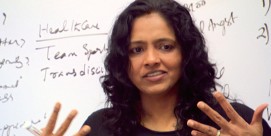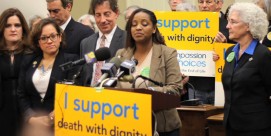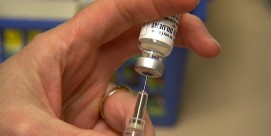BOB ABERNETHY, host: The recent outbreak of measles in California and other states has revived a national debate over vaccinations, as Deborah Potter reported last year. Should all parents be required to have their children vaccinated? Even if they have religious or other objections?
We want to pursue the debate about vaccinations with Kevin Eckstrom, editor-in-chief of Religion News Service. Kevin, welcome back here. How extensive is this outbreak?
KEVIN ECKSTROM: So as of the end of January there were more than 100 new cases of measles reported to the federal government. And while a hundred sounds small, it’s the rate of increase that’s really disturbing. Last year, there were 600 cases total throughout the whole year. In the first month of 2015, we’ve already had a hundred. And really you’re seeing this in pockets. It’s not super widespread, where you’re going to catch measles by going to the grocery store necessarily. It’s not like Ebola, with thousands of cases. But it’s the rate of increase that really troubles people, and it shows that people are getting exposed to measles and other diseases because they’re not getting vaccinated.
ABERNETHY: And the religious community? How does it respond to this?
ECKSTROM: So by and large the religious community is fine with vaccines. Yes, there are some questions, there are some concerns out there, but for the most part everybody is on board with vaccines. Where we’ve seen this pop up in religious populations, where we’ve seen measles, is in communities that don’t typically get vaccinated—so the Amish in Ohio, for example. It’s not that they don’t believe in vaccines, but they’re not required to go to public school, so they don’t typically get it. Christian Scientists typically don’t get vaccinated because they don’t believe in medicine, but when there have been outbreaks, they have been vaccinated. So there’s really no widespread religious objection to the vaccine, it’s more of a, what they call a “personal belief.” It’s that I have a belief that these vaccines are harmful, or that they don’t work, or I don’t believe that somebody else should be telling me how to raise my kids.
ABERNETHY: Or suspicion of science, or suspicion of the government.
ECKSTROM: Right. A lot of the anti-vaccine crowd, it’s not only that they don’t like vaccines, but they don’t like any study that is funded by the government or pharmaceutical companies, or really anybody else that sort of debunks this. So there was, as Deborah’s piece said, there was this widespread link between autism and vaccines. That’s been debunked, it’s been thrown out, it’s been retracted. I mean, they’ve said it’s not true, but people still believe it. And any study that comes along counter to that, there is this great deal of suspicion out there about anything that runs counter to your preordained views.
ABERNETHY: And for it to work, you have to have not only your own child vaccinated, but everybody else has to have the vaccination too, right?
ECKSTROM: Right. You need about 95 percent vaccination rates in order for them to actually work. Everybody has to be vaccinated in order for individuals to be protected. And what we’re seeing in these outbreaks is pockets where there’s high rates of kids who aren’t getting vaccinated, and that’s where it’s catching—in Marin County in California, in Orange County, California, in New Jersey, and everywhere else. So, it’s—there’s a need for a collective, good response here to take care of kids, and that’s really being challenged.
ABERNETHY: Kevin Eckstrom, many thanks.
ECKSTROM: Sure.







